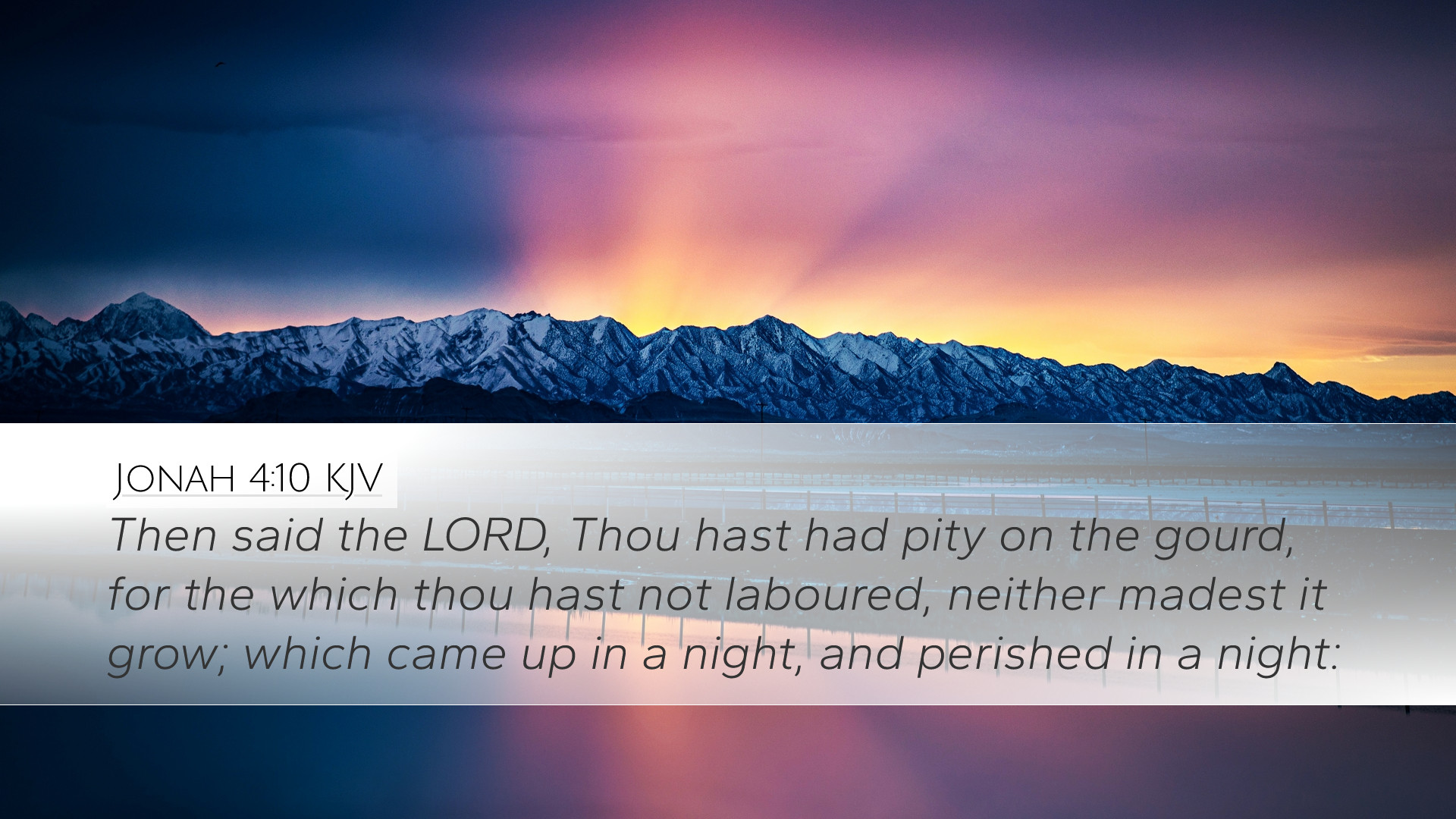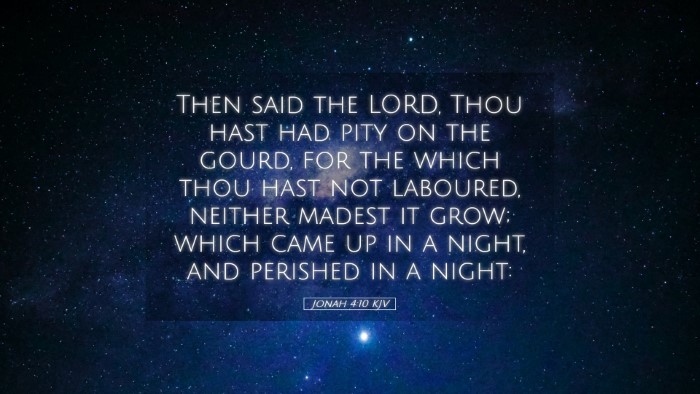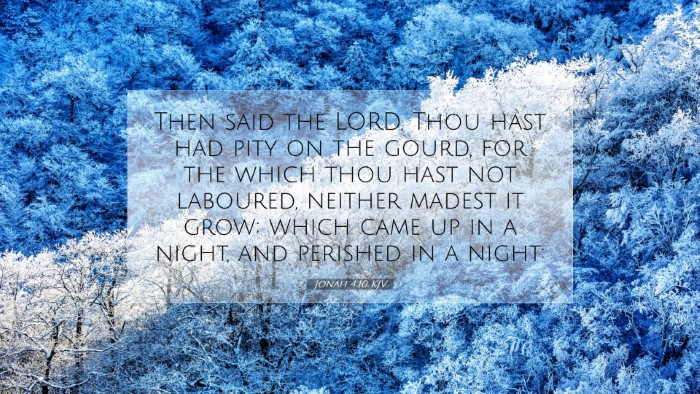Old Testament
Genesis Exodus Leviticus Numbers Deuteronomy Joshua Judges Ruth 1 Samuel 2 Samuel 1 Kings 2 Kings 1 Chronicles 2 Chronicles Ezra Nehemiah Esther Job Psalms Proverbs Ecclesiastes Song of Solomon Isaiah Jeremiah Lamentations Ezekiel Daniel Hosea Joel Amos Obadiah Jonah Micah Nahum Habakkuk Zephaniah Haggai Zechariah MalachiJonah 4:10
Jonah 4:10 KJV
Then said the LORD, Thou hast had pity on the gourd, for the which thou hast not laboured, neither madest it grow; which came up in a night, and perished in a night:
Jonah 4:10 Bible Commentary
Commentary on Jonah 4:10
Verse Context: Jonah 4:10 states, "Then said the Lord, Thou hast had pity on the gourd, for the which thou hast not laboured, neither madest it grow; which came up in a night, and perished in a night." This verse comes after Jonah's reaction to God's mercy on Nineveh, encompassing themes of compassion, divine providence, and the nature of true concern.
Introduction to the Commentary
This commentary synthesizes insights from various public domain sources, particularly Matthew Henry, Albert Barnes, and Adam Clarke. Each commentator offers valuable perspectives, emphasizing theological themes, character analysis, and practical applications pertinent to pastors, students, theologians, and scholars.
Textual Analysis
Literal Interpretation: The passage highlights God's interrogation of Jonah's misplaced pity. The "gourd" that provided Jonah shade was temporary, emphasizing the fleeting nature of earthly comforts compared to God's lasting compassion for humanity.
Matthew Henry's Insights
- Human vs. Divine Compassion: Henry points out that Jonah's affection for the gourd, a superficial plant, starkly contrasts with God's deep compassion for Nineveh, a city of significant spiritual and moral importance.
- Misplaced Priorities: He elaborates on how Jonah lamented the loss of a plant while ignoring the spiritual fate of thousands of souls. This illustrates a selfish concern that prioritizes personal comfort over the welfare of others.
- Divine Instruction: Henry suggests that this exchange serves as a didactic moment, revealing Jonah's need for a deeper understanding of divine mercy.
Albert Barnes' Commentary
- Symbolism of the Gourd: Barnes notes the gourd as a symbol of the transient joys and comforts that can lead to spiritual blindness. Jonah's attachment to the gourd reflects a broader human tendency to cling to the temporal.
- Moral Lessons: He emphasizes that God's question prompts believers to reflect on their values. Are we more concerned about our comforts than the wellbeing of others?
- God's Sovereignty: Barnes highlights God’s authority over creation, suggesting that His compassion extends beyond Israel to universally encompass all of mankind, including the once-repentant city of Nineveh.
Adam Clarke's Observations
- Jonah's Emotional State: Clarke examines Jonah's anger and disappointment, relating it to human responses when faced with divine grace shown to those we might deem unworthy.
- Teaching Through Contrast: He suggests that God uses this contrast between Jonah’s feelings for a plant and His feelings for the people of Nineveh as a powerful teaching tool, illustrating profound truths about grace and mercy.
- Lessons on Attachment: Clarke offers insight into human nature's inclination towards fleeting attachments, reminding us that true value lies not in earthly possessions but in God's eternal salvation.
Theological Implications
This passage invites deeper reflection on several theological themes:
- Compassion and Grace: The incident illustrates divine grace, challenging us to reassess how we express compassion, guiding believers to extend unmerited grace rather than judgment.
- Human Responsibility vs. Divine Sovereignty: The response encapsulates the tension between human actions and God's sovereignty in salvation. This reinforces that while we may labor for earthly concerns, God is sovereign over spiritual fruitfulness.
- Transformation of the Heart: Jonah’s story acts as a blueprint for understanding the need for internal transformation, prompting reflection on our attitudes toward others and God’s mercy.
Practical Applications
In light of this verse, several practical applications emerge for contemporary believers:
- Self-Reflection: Encourage individuals and communities to reflect on their attachments. Are we prioritizing temporary comforts over significant spiritual concerns?
- Broader Compassion: Foster a culture of compassion that mirrors God's love for all people, promoting outreach and ministry that reaches those whom society often overlooks.
- Teaching Moments: Pastors can utilize this narrative as a teaching moment, illustrating the importance of aligning our hearts with God’s values in our ministry and personal lives.
Conclusion
Jonah 4:10 serves as a powerful reminder of human tendencies toward selfishness juxtaposed with the expansive mercy of God. The insights provided by esteemed commentators like Matthew Henry, Albert Barnes, and Adam Clarke equip us with a nuanced understanding of God's character and challenge us to cultivate a heart that mirrors His compassion and grace for all people.


